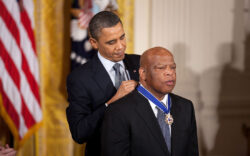Supreme Court Justice Ruth Bader Ginsburg’s death on Sept. 18 set off political and legal warfare in Washington that will resonate from the court to Capitol Hill to the White House. With yet another battle looming in the nation’s capital, with a persistent pandemic stalking the land, and with the Nov. 3 general election little more than a month away, citizens should use the power of their votes to steer this nation’s ship of state away from the its current course of darkness and demagoguery.
Ginsburg’s death came just two months after the passing of John Lewis, the civil rights workhorse and Georgia congressman who was called the “conscience of the Congress.” Lewis was beaten nearly to death in 1965 by Alabama state troopers during voting rights protests in the state, and for all his life he stressed the importance of voting by all citizens. Lewis bled and went to jail for the right to vote. “Your vote is precious, almost sacred, “ he said. “It is the most important nonviolent tool we have to create a more perfect union.”
Both Ginsburg and Lewis worked to forge that more perfect union. “One lives not just for oneself, but for one’s community,” said Ginsburg. Like Lewis, she supported voting rights for all, and, like Lewis, she supported American women’s right to individual choice on the abortion issue, saying, “When government controls that decision for her, she’s being treated as less than a fully adult human responsible for her own choices.” With their lives and legacies, Ruth Bader Ginsburg and John Lewis showed the sacredness and significance of the American right to vote, a hard-won right gained through a history of courage on battlefields, in courthouses and in countless protests crying for this nation to live up to its ideals.
Georgia is shaping up to be a coveted state during this year’s general election slugfest between President Donald Trump and former Vice President Joe Biden. The Peach State has been reliably Republican in most presidential elections over the last four decades, and that record will probably continue this year, but a larger turnout by Democrats this year could change the state’s political map from Republican red to Democratic blue in an election year that already has been filled with surprises.
Young people are the least dependable of potential voters in this nation, where the voting age has been 18 since 1971. Such slackness by voting-age young people is particularly disheartening here in Georgia since it was this state that was the first to grant the vote to 18-year-old citizens back in 1943.
Back then, Georgia had a progressive governor named Ellis Arnall who called himself “a practical idealist.” During his single term in office, the Democrat’s administration paid off state debts, started the Teachers Retirement System that still benefits Georgians today, backed the accreditation of Georgia’s university system, instituted prison reforms and repealed a poll tax long used in the state to keep African Americans away from the ballot box. As World War II raged in 1943, Gov. Arnall led the campaign to lower the voting age to 18 with the slogan “Old enough to fight, old enough to vote.”
In his 1946 book, The Shore Dimly Seen, Ellis Arnall gave prescient warnings for the people of his state and nation in the perilous postwar years. The young politician decried racism in his home state and across America, issued early warnings about environmental issues decades before Earth Day events of 1970, and reminded his readers that even after the defeat of fascism in the war, this nation was still haunted by the specter of home-grown Hitlerism in the form of white supremacist policies and right-wing organizations that he called “the ingredients of fascism.”
In America today, the ingredients of fascism are again being stirred into this nation’s already boiling political cauldron. It is up to the voters to turn down that political heat in the spirit of Arnall, who said, “Politics is the science of bringing people together on a common concept… There is nothing wrong with government that democracy won’t cure.”
Like what you just read? Support Flagpole by making a donation today. Every dollar you give helps fund our ongoing mission to provide Athens with quality, independent journalism.










